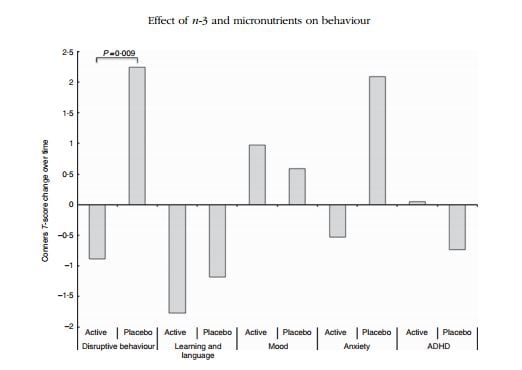It found significant results in omega-3 forms eicosapentaenoic acid (EPA) and docosahexaenoic acid (DHA) even though the optimum level of 8% bodily lipid composition from DHA and EPA was not achieved.
Findings
The study, conducted by researchers from the University of Oxford, enrolled 196 healthy children aged 13-16 years old onto a 12 week double-blind randomised placebo controlled trial and split into two groups. One group was given the nutritional supplements (Vitabiotics' WellTeen tablets) while the other group were given placebos.

Blood samples were taken to measure the change in vitamin, mineral and omega-3 levels during the study. These were found to be low at the start of the study and significantly improved in the treatment group receiving the nutrient supplements over the 12 weeks.
Behaviour change was measured using school disciplinary records and the Conner’s scale – an assessment tool capable of supporting the diagnostic and identification process.
Results showed that the behaviour in the students receiving the supplements improved, while the behaviour of the pupils receiving the placebo worsened.
“Nutrient deficiencies have been implicated in antisocial behaviour, hence correcting them may improve sociability,” said lead researcher John Stein, Emeritus professor of physiology, at the University of Oxford.
“When assessed using validated and standardised tests, supplementary nutrition may have a protective effect against worsening behaviour.”
“8% is the ideal omega-3 level”

Although there are no officially recommended levels of these fatty acids, there is general agreement that EPA and DHA should constitute 8% of total lipid composition.
In the teenage subjects featured in this study, the researchers found they amounted to only half of the ideal at only 4 %. “Although all nutrients are important, omega-3 are particularly so, especially when the brain is experiencing rapid growth during puberty and is at its most sensitive to insufficient supply,” the study noted.
“Although we achieved significant improvements post-treatment, the omega-3 index did not reach the 8%, which has been associated with the greatest protection against coronary heart disease. This may suggest that the duration of our supplementation was insufficient, and this could help explain our disappointing results with respect to the children’s disciplinary offences.”
The study concluded that the evidence presented here suggested that broad-spectrum vitamin, mineral and omega-3 supplementation may have a protective effect against anti-social behaviour, when assessed using Conner's scales.
“We also found some evidence that supplementation may decrease misbehaviour among children whose prior rates were high, yet may increase it in children whose baseline rates were low.”
“Thus, if unusual behaviour is a manifestation of non-optimal nutrient intake, these findings warrant further investigation with larger numbers, increased nutrient dose and stratifying offending rates.”
Source: British Journal of Nutrition
Published online ahead of print, http://dx.doi.org/10.1017/S0007114515004390
“A randomised double-blind placebo-controlled trial investigating the behavioural effects of vitamin, mineral and n-3 fatty acid supplementation in typically developing adolescent schoolchildren.”
Authors: Jonathan Tammam, David Steinsaltza, D. W. Bestera, Turid Semb-Andenaesa and John F. Steina.
